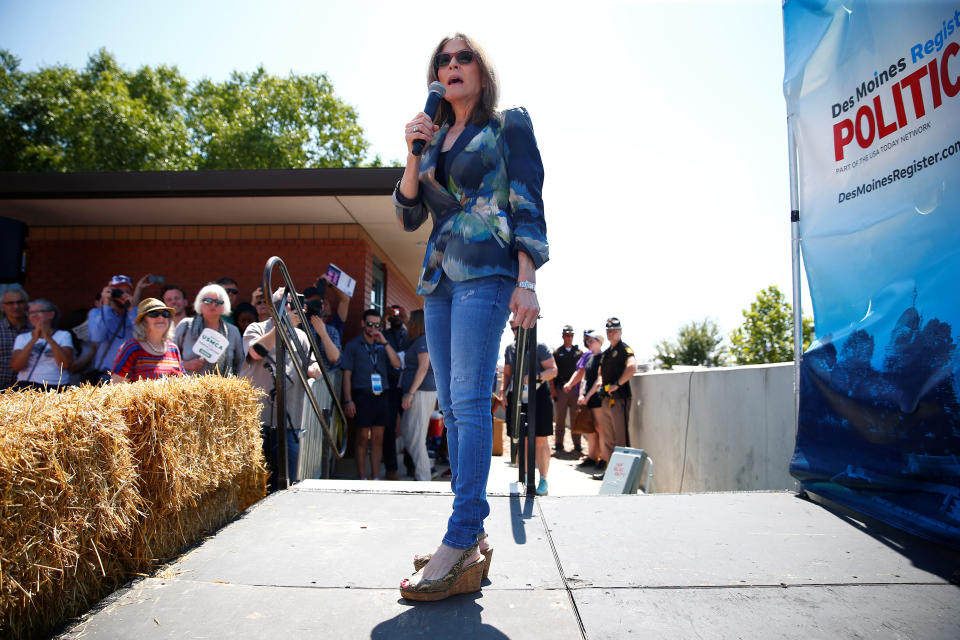'I've never had a crystal': Marianne Williamson demands to be taken seriously
Marianne Williamson sometimes feels like the butt of the joke — and, oftentimes, she is.
A quick scan of the Instagram or Twitter hashtag “Marianne Williamson” conjures up facetious memes painting the author and spiritual leader as a rose quartz devotee, essential oil hawker and New-Agey character. At first, Williamson found the attention charming, if a little distracting. But as a deluge of tough press followed, the bemusement washed away — and in its wake is a very ticked-off presidential candidate.
“This idea that I’m a crystal woo woo lady ... the crystal woo woo lady image, to some extent amusing, has no relation to reality,” she said during a sit-down interview with Yahoo News. “I’ve never had a crystal, I’ve never written about crystals. I’ve never talked about crystals. I’ve never had a crystal onstage with me.”
As Williamson, who has low name recognition compared to her high-profile political rivals, gained more traction in the national media, she fell under increased scrutiny for her previous writings and was accused of being part of the anti-vaccine movement and anti-science. In early August, CNN anchor Anderson Cooper pressed Williamson on previous remarks calling clinical depression “a scam” (Williamson apologized during the segment) as well as on controversial remarks she made about the passing of Robin Williams.
While such scrutiny is seemingly routine during presidential campaigns, Williamson believes that something larger and more orchestrated was playing out. “Something far more sinister was starting to happen,” she said.
Williamson claimed that “left-wing voices” amplified news stories that called her credibility into question. Many of those stories, she argued, are “out-and-out lies.”

When asked about apparent right-wingers who gleefully tweet about how they revel in Williamson’s place within the debates for entertainment value, she still insisted that “unfortunately the vicious smears have not been coming from Republicans.”
Williamson said the constant criticism was part of a “well-designated strategy,” though she was unable to give the name of a person or persons behind this alleged plan.
“The words were all the same,” said Williamson. “‘Anti-science,’ ‘anti-medicine,’ ‘dangerous,’ ‘crazy’ and ‘grifter.’ I mean, you couldn’t be clearer. Those were the words repeated in all of the articles, all of the stories. They were meant to create suspicion in people’s minds. They were meant to create doubt, lest anybody even think of taking me seriously as a candidate. But I think at this point, just as that smear campaign cast doubt on my credibility, the fact that I’ve been out there, that people have heard me more themselves, people have seen my clips, enough has begun to cast doubt on the credibility of those who have projected onto me such mischaracterization.”
But Williamson’s visibility, at least to those tuning in to cable news, has taken a hit. She didn’t qualify for the upcoming October debate in Ohio, and she faces barriers to the November stage as well. When asked how she’s going to be able to press against what she believes to be a disinformation campaign against her on a national stage when she doesn’t have that platform, she said she faced limits even in her previous debates anyhow.
“I’m sure they just didn’t get around to me. I’m sure they wanted to,” Williamson joked of her modest airtime compared to the other candidates. According to the Washington Post, Williamson only spoke on air for “just under nine minutes,” about half the time seized by Sens. Bernie Sanders and Elizabeth Warren.
When asked if she was insinuating that moderators asking more questions of other candidates (many of whom were outpolling her) was part of what she described as the media “dictating the process,” she answered simply: “Duh.”

On a leaked hot-mic clip from an interview with Eric Bolling, Williamson was overheard saying that conservatives treat her more fairly than liberals, even though she self-identifies as a “left-wing liberal.”
“What does it say that Fox News is nicer to me than the lefties are? What does it say that the conservatives are nicer to me?” she asked.
Whatever apparent love she’s getting from the right — genuine or not — has not been enough to push Williamson into middle-of-the-pack status in a crowded primary field. RealClearPolitics’ polling average paints a challenging picture for the Williamson campaign — at 0.7 percentage points, she doesn’t even make the board.
Still, she insists that her campaign is viable, pointing to a doubled campaign haul of $3 million this quarter, and has the potential to have the impact of some of her rivals’ more sprawling campaigns, even if her team’s muscle is leaner than nearly all others.
“My campaign is like a bonsai tree,” said Williamson. “A bonsai tree has everything that a big tree has. But it’s within the limits of those glass walls. So, I have everything every campaign has, just less of it. I’ll have three field organizers, somebody else has 90.”
But does that bonsai tree have enough seeds to grow in expensive states like New Hampshire and Iowa? According to Williamson, she could always use some more donations.
“More people are realizing, ‘If we want her in there, we’re going to have to send money,’” she said. “I hope that your readers will go to marianne2020[.com] and do that.”
Read more from Yahoo News:
Hunter Biden’s work in Ukraine is a problem, but not just for Democrats
Intelligence whistleblowers face a dangerous path to Congress
Experts criticize White House use of sensitive computer system to store Trump transcripts
PHOTOS: New book unveils unique insights from behind the lens of conflict photography



